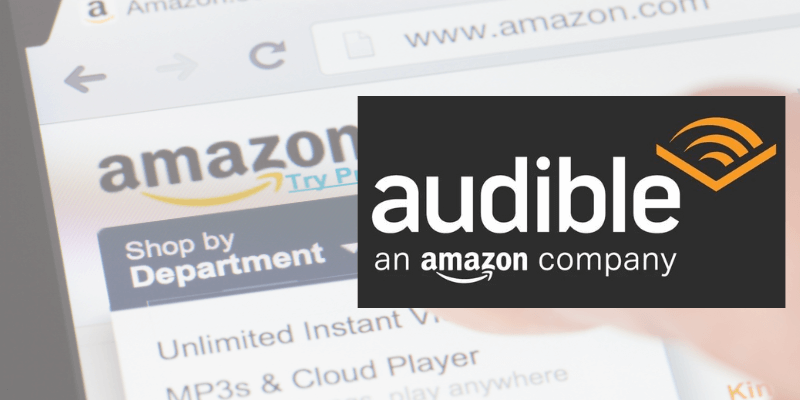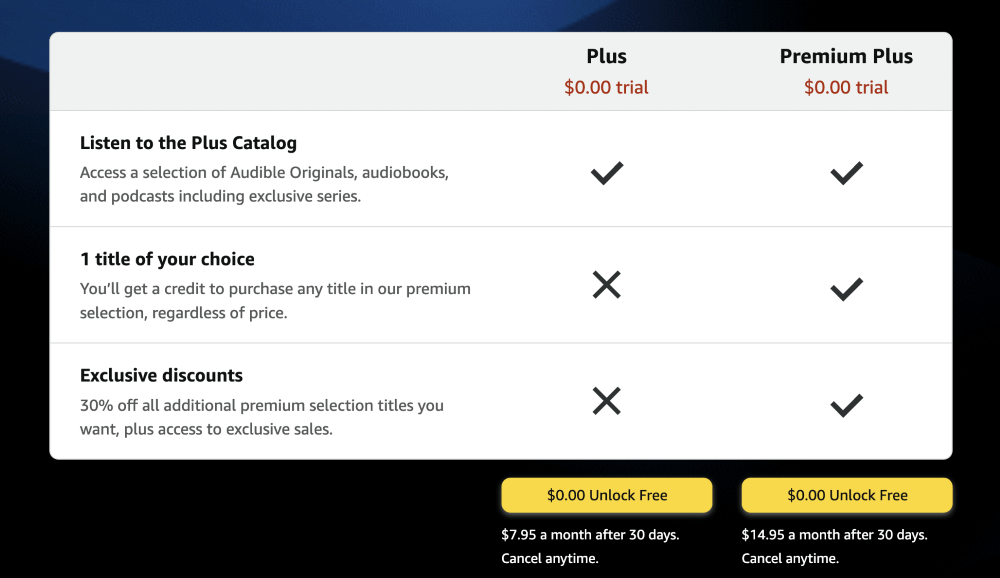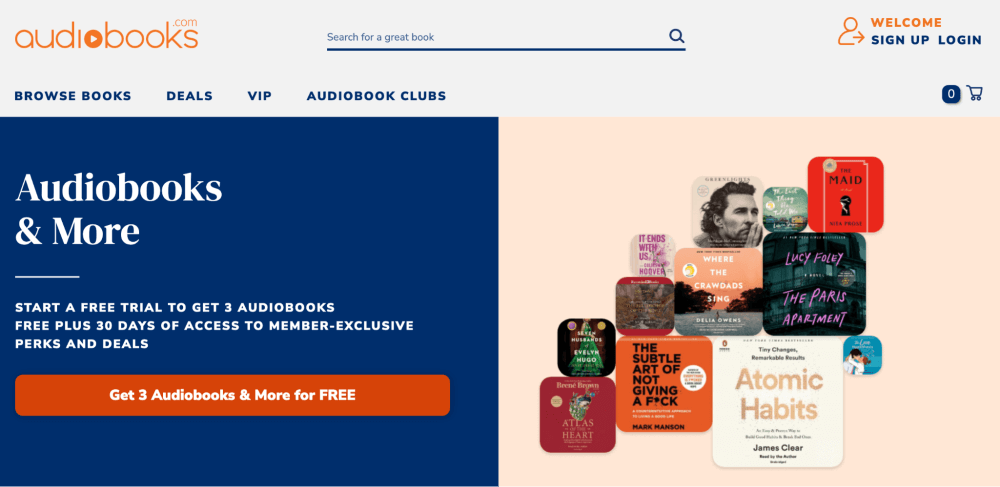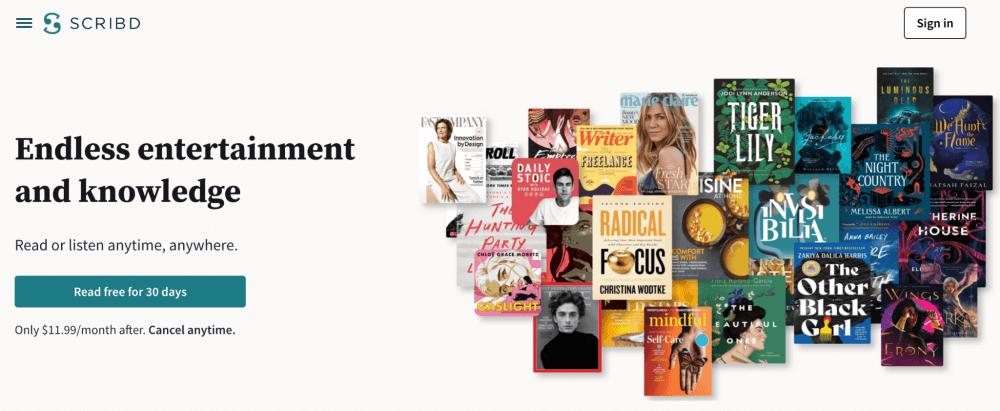If you love consuming literature via audiobooks, then absolutely! If not, it might still be worth it, but you must consider how often and when you’ll use the service. If you’re considering an audiobook subscription service, Audible is one of the best available.

Hi, I’m Aaron. I was a long-time Audible user and listened to books while I learned, worked, and played. I ultimately realized that I preferred reading books and that I wasn’t retaining the information I heard. More on that below.
Let’s take a look at what Amazon Audible has to offer, some points to consider when signing up for an audiobook service, and how Audible stacks up to the competition.
Table of Contents
Key Takeaways
- Audible has many benefits including its selection, ease of use, and integration with other Amazon services.
- Audible also has some drawbacks, like cumulative licensing costs and unavailability of foreign titles.
- Audible also has many competitors which provide similar services overall.
- Finally, you technically don’t own your audiobooks, but for now they’re yours to keep forever.
Audible and Its Benefits
Audible is an audiobook and podcast distribution platform. You can buy individual books or you can subscribe to listen to a selection of books for free, kind of like Amazon Music or Prime Video. You’ll pay $14.95 per month, as of the writing of this article, to do so.
Amazon’s chief benefit is the library of books it provides. Audible boasts hundreds of thousands of audiobooks with hundreds for free. Subscribing to the service also provides at least one free audiobook per month. You can also purchase plans that provide credits that let you purchase other audiobooks.

The great thing about Audible’s free book selection is that it’s not limited to Audible members. If you subscribe to Amazon Prime, you too have a selection of free Audible books from which to choose. Most of those books are Amazon Originals, published by Amazon and only available on Audible, or books for which the copyright has expired, meaning lots of great classics.
Amazon also provides great convenience and ease of use. You can load Amazon Audible on Windows, Android, and iOS devices. You don’t even need an internet connection so long as you’ve previously rented and downloaded the audiobook.
Audible uses intelligence to provide recommendations based on your reading and listening habits. You can also adjust narration speed, allowing you to listen at a pace that suits your preference, whether you want to speed through a book or take your time and savor the narration.
Finally, if you have an Amazon Kindle, Whispersync for Voice will sync your audiobooks with your Kindle. So you can listen to an audiobook and pick up reading where you left off listening (or vice versa).
Audible’s Drawbacks
Like most other online services, Audible has quirks that could be perceived as drawbacks. Whether or not you find them to be drawbacks depends on your situation and need for a service like Audible’s.
The first drawback is price. Audible costs $7.95 or $14.95 per month depending on the plan you choose. If you want access to best sellers through Audible, then you have to purchase the Premium Plus plan for $14.95 per month.

You can then pay an additional annual fee for credits:
- $22.95 per month for two credits per month (one more than the Premium Plus plan)
- $149.50 per year for twelve annual credits
- $229.50 per year for twenty-four annual credits
That might seem like a lot. Put differently, the 24 credit plan breaks down to $9.56 per book for premium selection books. If you know you’re going to buy 24 new or best-selling audiobooks, which could be worth $15 or $20 each, you’ll save money with Audible’s Annual Premium Plus plan.
You’re not getting the ebook with that, which some may see as a drawback, especially if they want to use Whispersync. If the book is available as part of the Kindle Unlimited plan, which also costs $9.99 per month, you can get it through that. Otherwise, you need to pay for the book separately.
This was my personal drawback, as mentioned above. I love reading and really enjoyed listening to audiobooks when I was doing something else. The problem is that I had terrible retention of what I listened to, probably because I was multitasking. So ultimately, a subscription audiobook service wasn’t for me.
Another drawback is for non-English speakers. Amazon Audible has a wonderful selection of books available in English. Other languages may be lacking. That’s not unique to Amazon and is a common issue among major audiobook vendors.
There have also been suggestions that Audible has increased its focus on in-house Amazon Originals to promote Amazon’s publishing arm. That trend has happened in the video subscription space with Amazon, Netflix, iTunes, Hulu, and others. So while it’s not surprising, it’s something to think about when using Audible.
How Audible Stacks Up to the Competition
There are a few major competitors in the audiobook space. Many of them don’t provide subscription programs, but they provide competitively-priced audiobooks. Some of them even claim to have a larger selection.
Perhaps the largest competitor is Audiobooks.com. They provide credits to VIP members, who can either use the credit to purchase an audiobook for free or join one of eight audiobook clubs for a month. Those clubs let users listen to any of the thousands of available books for free that month.

Scribd is another competitor who’s been around for over a decade. It provides access to a wider catalog than Audible for a lower price: $11.99. Their numbers are a little skewed: they include both ebooks and audiobooks in their count of millions of available books. Still, where a comparable Audible plan would cost $24.98, that’s a great deal.

Finally, Libro.fm provides a comparably priced alternative to Audible, at $14.99. With Libro.fm, you pick a local bookstore and offer them patronage through the platform. So your audiobook purchases support local bookstores.
Do I Own My Audible Books?
This is a great question that gets asked a lot. The answer is a resounding No.
When you buy an audiobook, you’re buying a perpetual but revocable license to that audiobook. Audible says it’s yours forever, but can change those terms at any time.
For now, though, you can keep books you purchase or receive through Audible perpetually. They’re yours forever in that respect.
That’s not limited to Audible. Most services provide revocable licenses for audiobooks and have the digital licensing infrastructure to revoke those licenses, if needed.
Conclusion
Audible is an excellent service for the price and widely used by millions of Amazon customers. There are definite pros and cons to the service, but overall it’s a solidly performing service.
There are also other competing services which have their own pros and cons. Since you don’t lose anything jumping from one service to another, there’s no problem with trying out multiple services.
Do you use Audible or another audiobook service? What do you think about them?
